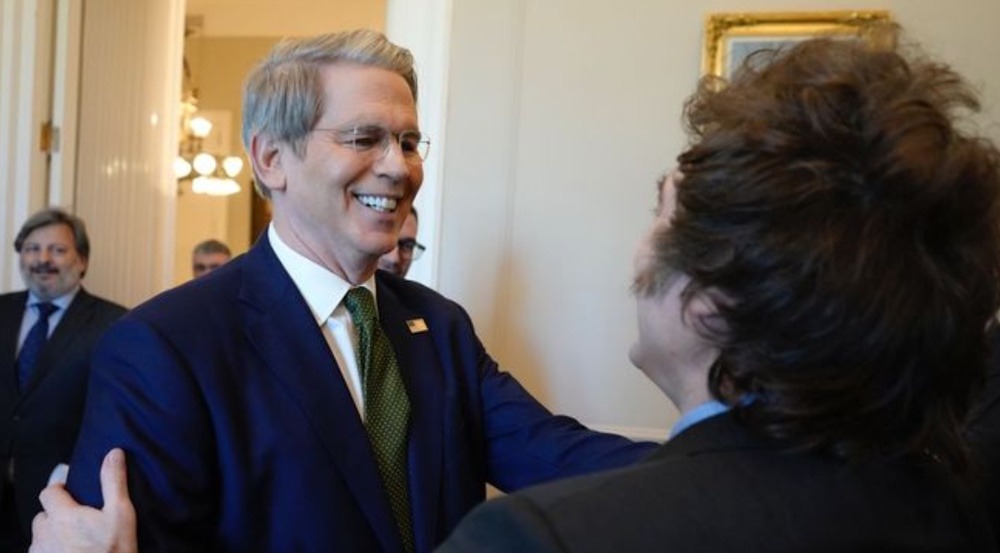US Treasury Secretary Scott Bessent pledged to provide “all options for stabilisation” to President Javier Milei as he endeavors to prevent Argentina from reverting to crisis, which has led to a rally in the nation’s assets. Bessent and US President Donald Trump are scheduled to engage in discussions with Milei in New York on Tuesday. Bessent indicated on Monday via a thread on X that “more details will be available shortly after this meeting.” Options encompass, but are not confined to, currency swap lines, direct currency repurchases, and US dollar-denominated debt from the Treasury’s exchange stabilization fund.
Argentina’s dollar bonds reached session highs following the announcement, with notes maturing in 2035 increasing nearly eight cents on the dollar to trade above 55 cents, as indicated by data. The peso appreciated by nearly three percent to 1,432 per dollar as of 12:45 PM, while the benchmark S&P Merval stock index increased by over six percent. “For Washington, Milei represents more than an economic partner: He is also a strategic geopolitical ally as the US seeks to build a bloc of like-minded governments in Latin America,” stated Claudio Zampa. Backing Milei strengthens the Trump administration’s assertive stance in the region. Bessent referred to Argentina as “a systemically important US ally” and highlighted the potential for private investment opportunities within the nation. In contrast, Trump enacted significant tariffs on neighboring Brazil prior to the Supreme Court’s sentencing of former leader Jair Bolsonaro to prison for conspiring to orchestrate a coup. The US president has issued a warning to Venezuela’s Nicolas Maduro by targeting boats linked to alleged drug-traffickers.
A direct loan from the US Treasury to a foreign country would be quite atypical, yet it is not without precedent. In early 1995, President Bill Clinton directed the Treasury to withdraw US$20 billion from its currency stabilization fund to provide a loan to Mexico, as part of a comprehensive foreign rescue initiative aimed at stabilizing a faltering peso. Milei has strategically fostered ideological connections with Trump, making a visit to Mar-a-Lago soon after his electoral triumph in November 2024. Recent US backing for Argentina would be in addition to its US$20-billion arrangement with the International Monetary Fund, finalized in April. IMF Managing Director Kristalina Georgieva acknowledged Bessent’s backing for Argentina, stating in a post “this underscores the crucial role of partners in promoting strong policies for stabilisation and growth” in Argentina.
Bessent, during a rare visit by a US Treasury Secretary to Argentina five months ago, referred to the IMF deal as a “fulcrum day” for the crisis-prone nation. At that moment, he minimized the likelihood that Milei would have to allocate funds to support the peso. “The good thing about having the money is the bigger your war chest, the more unlikely that you’re going to have to intervene,” Bessent stated in an interview conducted in Buenos Aires. “It will serve as a smoothing function. I will be monitoring it attentively. Argentina’s President and Economy Minister Luis Caputo expressed their gratitude to Bessent for his recent support in individual posts on their X accounts. The Treasury Secretary indicated during a briefing on Monday that the US is ready for a “large and forceful” intervention in Argentina. Milei’s Central Bank sold US$1.1 billion over three days last week to support the peso in Argentina’s currency market as pressure intensified, resulting in sovereign bonds experiencing the most significant losses in emerging markets. In recent weeks, investor sentiment has been dampened following a bribery scandal involving Milei’s sister and chief adviser, Karina. Additionally, his administration faced an unexpected defeat in a crucial vote in Buenos Aires Province, losing by a significant margin. Milei’s government has taken measures to preserve hard currency reserves by implementing a temporary suspension of crop tariff exports, announced on Monday, as part of its strategy to increase dollar inflows while simultaneously defending the peso.
Matias Montes, indicated that if the US Treasury’s announcement proves to be as robust as it appears, it may shift political concerns regarding the midterm elections to a secondary position. “The most important thing is for the exchange market to stabilize so the Central Bank doesn’t deplete its foreign currency reserves,” he stated. Argentina’s midterm elections on October 26 represent Milei’s most significant electoral challenge since assuming office in 2023. Current polls indicate a rising disapproval rating for him, while the lead of his party over the Peronist opposition has diminished by half. In addition to the bribery allegations and the significant losses in provincial elections, Milei’s opponents in Congress have successfully reversed several of his vetoes on widely supported expenditure areas, including education and healthcare. This development has heightened investor apprehensions regarding his governance capabilities. Milei’s meeting with the US president and his Treasury secretary “could be the bridge Argentina needs” to regain momentum heading into next month’s vote, which will refresh more than half of Congress, according to Malcolm Dorson.
“If Milei and Bessent walk out of tomorrow’s Trump meeting with even a vague roadmap for near-term US support, it’s bullish for Argentinian assets,” Dorson stated. The economic recovery under Milei’s administration has stumbled, with output experiencing a slight contraction in the second quarter, and analysts predicting another decline in the period from July to September. Unemployment continues to be higher than the levels observed prior to Milei’s tenure, with a greater number of employers in critical sectors such as manufacturing and construction indicating plans to reduce their workforce in the upcoming months, as per government surveys.

